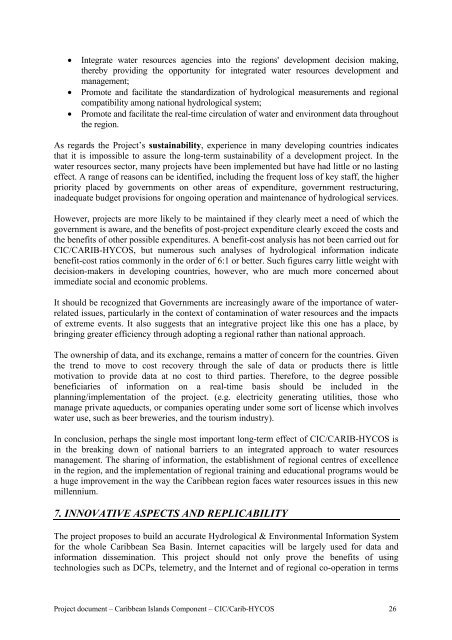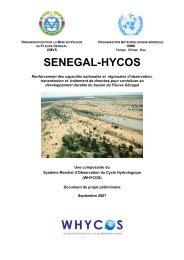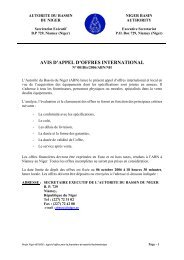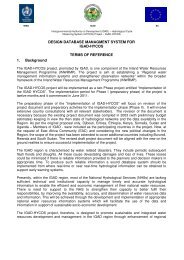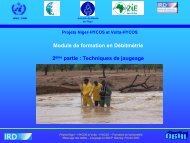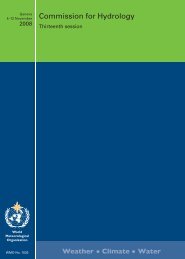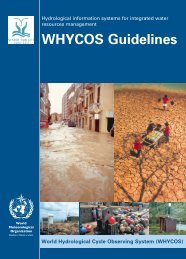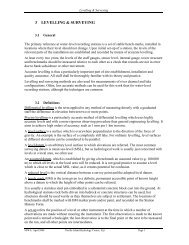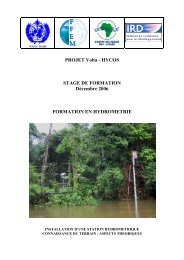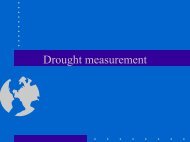CARIB-HYCOS - WHYCOS
CARIB-HYCOS - WHYCOS
CARIB-HYCOS - WHYCOS
Create successful ePaper yourself
Turn your PDF publications into a flip-book with our unique Google optimized e-Paper software.
• Integrate water resources agencies into the regions' development decision making,thereby providing the opportunity for integrated water resources development andmanagement;• Promote and facilitate the standardization of hydrological measurements and regionalcompatibility among national hydrological system;• Promote and facilitate the real-time circulation of water and environment data throughoutthe region.As regards the Project’s sustainability, experience in many developing countries indicatesthat it is impossible to assure the long-term sustainability of a development project. In thewater resources sector, many projects have been implemented but have had little or no lastingeffect. A range of reasons can be identified, including the frequent loss of key staff, the higherpriority placed by governments on other areas of expenditure, government restructuring,inadequate budget provisions for ongoing operation and maintenance of hydrological services.However, projects are more likely to be maintained if they clearly meet a need of which thegovernment is aware, and the benefits of post-project expenditure clearly exceed the costs andthe benefits of other possible expenditures. A benefit-cost analysis has not been carried out forCIC/<strong>CARIB</strong>-<strong>HYCOS</strong>, but numerous such analyses of hydrological information indicatebenefit-cost ratios commonly in the order of 6:1 or better. Such figures carry little weight withdecision-makers in developing countries, however, who are much more concerned aboutimmediate social and economic problems.It should be recognized that Governments are increasingly aware of the importance of waterrelatedissues, particularly in the context of contamination of water resources and the impactsof extreme events. It also suggests that an integrative project like this one has a place, bybringing greater efficiency through adopting a regional rather than national approach.The ownership of data, and its exchange, remains a matter of concern for the countries. Giventhe trend to move to cost recovery through the sale of data or products there is littlemotivation to provide data at no cost to third parties. Therefore, to the degree possiblebeneficiaries of information on a real-time basis should be included in theplanning/implementation of the project. (e.g. electricity generating utilities, those whomanage private aqueducts, or companies operating under some sort of license which involveswater use, such as beer breweries, and the tourism industry).In conclusion, perhaps the single most important long-term effect of CIC/<strong>CARIB</strong>-<strong>HYCOS</strong> isin the breaking down of national barriers to an integrated approach to water resourcesmanagement. The sharing of information, the establishment of regional centres of excellencein the region, and the implementation of regional training and educational programs would bea huge improvement in the way the Caribbean region faces water resources issues in this newmillennium.7. INNOVATIVE ASPECTS AND REPLICABILITYThe project proposes to build an accurate Hydrological & Environmental Information Systemfor the whole Caribbean Sea Basin. Internet capacities will be largely used for data andinformation dissemination. This project should not only prove the benefits of usingtechnologies such as DCPs, telemetry, and the Internet and of regional co-operation in termsProject document – Caribbean Islands Component – CIC/Carib-<strong>HYCOS</strong> 26


